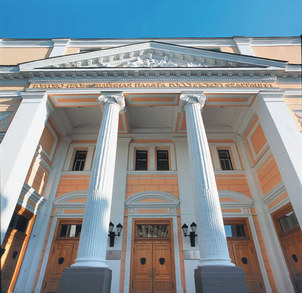UNIDO Centre’s support in fulfilling Russia’s obligations under the Stockholm Convention on Persistent Organic Pollutants (POPs) discussed at the Chamber of Commerce and Industry of the Russian Federation
March 06, 2018

On 2 March 2018 a meeting of the Committee on Environmental Management and Ecology of the Chamber of Commerce and Industry of the Russian Federation was held on the theme: “Hazardous waste management in Russia: possible ways forward”.
Representatives of relevant ministries and agencies, professional industry associations of waste processors, and businesses were invited to take part in the event. The meeting was attended by representatives of the UNIDO Centre in the Russian Federation, namely, the Director of the UNIDO Centre in Russia Sergey Korotkov; National project coordinator Vladimir Komissarov (Project “E-waste academy for CIS countries”); National expert Ekaterina Demicheva.
At the meeting, Sergey Korotkov presented UNIDO activities focused on supporting the fulfillment of Russian Federation’s obligations under the Stockholm Convention on POPs. The Convention, which has been in force since 2004, is an international legal instrument regulating management of hazardous chemical substances and wastes, including the polychlorinated biphenyls (PCBs). Within the framework of the project “Environmentally sound management and final disposal of PCBs at the Russian railroad network and other PCBs owners” the UNIDO Centre is carrying out work aimed at assisting the establishment of a PCBs management system in Russia.
The significance of the project is recognized at the governmental level. On 3 October 2017 by order №529 of the Minister of Natural Resources and Environment of the Russian Federation a National plan for the implementation of the Stockholm Convention was adopted. The UNIDO project is included in the Plan as one of the main activities of Objective №3 “Treatment and disposal of accumulated unused and prohibited pesticides, industrial waste and equipment, containing POPs”. Nevertheless, as observed by the Director of the UNIDO Centre, resources of the project only allow to set the stage for the establishment of foundations of a PCBs management system and to demonstrate its operability in a pilot mode. “A successful functioning of the system is a challenge facing the industry and the State underpinned by the symbiosis within existing mechanisms and programmes,” concluded Sergey Korotkov.

